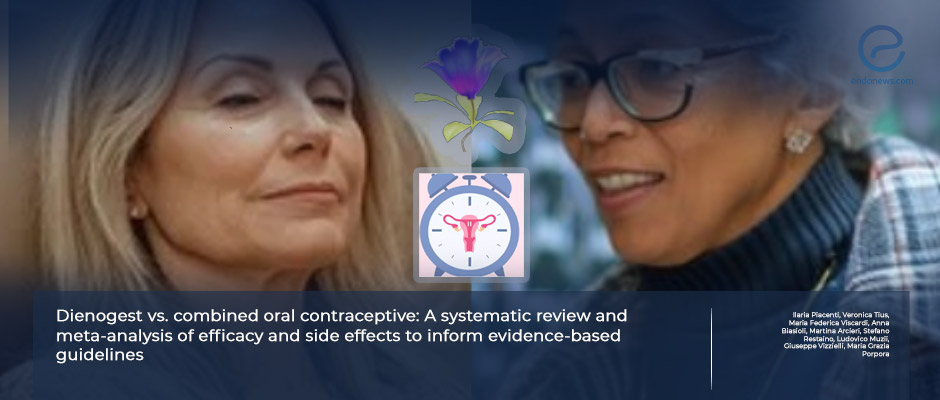Endometriosis: Menopausal Hormonal Options Compared
Jun 6, 2025
Balancing Efficacy and Tolerability in Endometriosis in Menopause: What Does the Evidence Say?
Key Points
Importance:
- Women with endometriosis face a 7-fold increased risk of surgical menopause.
- Long-term medical management aims not only to control symptoms but also to delay or prevent premature menopause.
Highlights:
- Pharmacological therapy—hormonal or nonhormonal—is recommended as the first-line treatment for women with endometriosis to help prevent early or surgical menopause.
- This study found that the synthetic progestin dienogest offered no clear advantage over combined oral contraceptives in terms of efficacy or side effect profile.
What's done here:
- An Italian research group systematically searched PubMed, Medline, and Google Scholar for comparative studies evaluating dienogest and COCs in endometriosis.
- Five studies were included: 4 randomized controlled trials and 1 observational study.
- A total of 459 patients were analyzed: 191 treated with progestin and 268 treated with COCs
- The primary outcome was tolerability: including discontinuation rates and side effects.
- Secondary outcomes assessed the treatment impact on endometriosis-related symptoms such as pelvic pain, dysmenorrhea, and dyspareunia.
Key Results:
- Out of 4,315 studies initially screened, only 5 (four randomized controlled trials and one observational study) were eligible for analysis.
- Pelvic pain and dysmenorrhea outcomes were NOT statistically significant different between the groups.
- Dyspareunia was reported to be significantly less severe in the COC group compared to the dienogest group.
- Treatment discontinuation rates were similar: Dienogest group: 6%; COC group: 10.9% — this difference was not statistically significant.
- Reported side effects (e.g., abnormal bleeding, nausea, headache, hot flushes, hair loss) were comparable between both therapies.
- Both therapies are viable options for long-term symptom management in women with endometriosis.
- Given the absence of clear superiority, treatment should be individualized based on patient preferences, symptom profiles, and long-term management goals, including the prevention of early or surgical menopause.
From the Editor-in-Chief – EndoNews
"In managing endometriosis, the goal extends beyond symptom suppression—it's about preserving long-term health and delaying irreversible interventions like surgical menopause.
This comparative analysis reinforces a critical point: neither progestins nor combined oral contraceptives show clear superiority. Instead, treatment should be tailored to the patient’s needs, tolerability, and reproductive goals. In an era of personalized medicine, the best therapy is not the newest, but the one that fits."
Lay Summary
Endometriosis causes inflammation and often leads to reduced ovarian reserve. Women with endometriosis are at a higher risk of entering menopause earlier—either naturally or due to surgery. To help preserve ovarian function and manage symptoms, clinicians often prescribe long-term hormonal treatments. One such medication is dienogest, a fourth-generation synthetic progestin known for its tolerability and effectiveness.
A team of researchers from Santa Maria Hospital in Terni, Italy, led by Dr. Piacenti, conducted a systematic review to compare dienogest with combined oral contraceptives (COCs), another common hormonal treatment used in endometriosis. Their goal was to evaluate whether one option offered better outcomes in preventing early menopause and managing endometriosis-related symptoms.
After reviewing studies published between 1948 and 2024, the team selected five relevant clinical trials for detailed analysis. The results, published in Acta Obstetricia et Gynecologica Scandinavica, showed no significant difference between dienogest and COCs in terms of treatment tolerability or effectiveness in reducing symptoms like pelvic pain and menstrual discomfort.
Although the number of patients and treatment durations in these studies were limited, the findings support that both dienogest and COCs are effective and well-tolerated options. Dienogest continues to be favored for its non-androgenic profile, ease of use, and reliable symptom control—comparable to that of more aggressive therapies like GnRH agonists.
In conclusion, both treatments can be confidently recommended for long-term use in women with endometriosis to help control bleeding, reduce inflammation, suppress ovarian activity, and improve quality of life.
Research Source: https://pubmed.ncbi.nlm.nih.gov/40312882/
natural menopause early menopause premature ovarian incufficiency surgical menopause dienogest oral contraceptves hormonal treatment endometriois.

